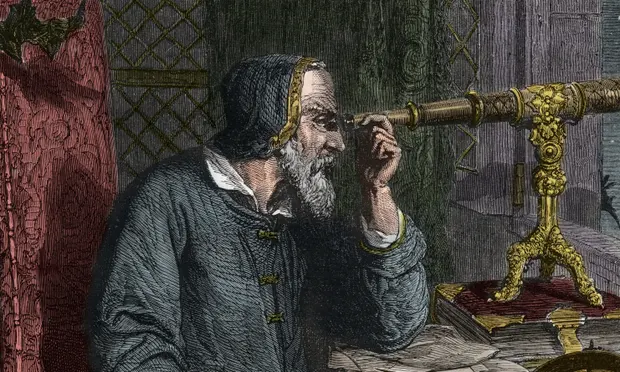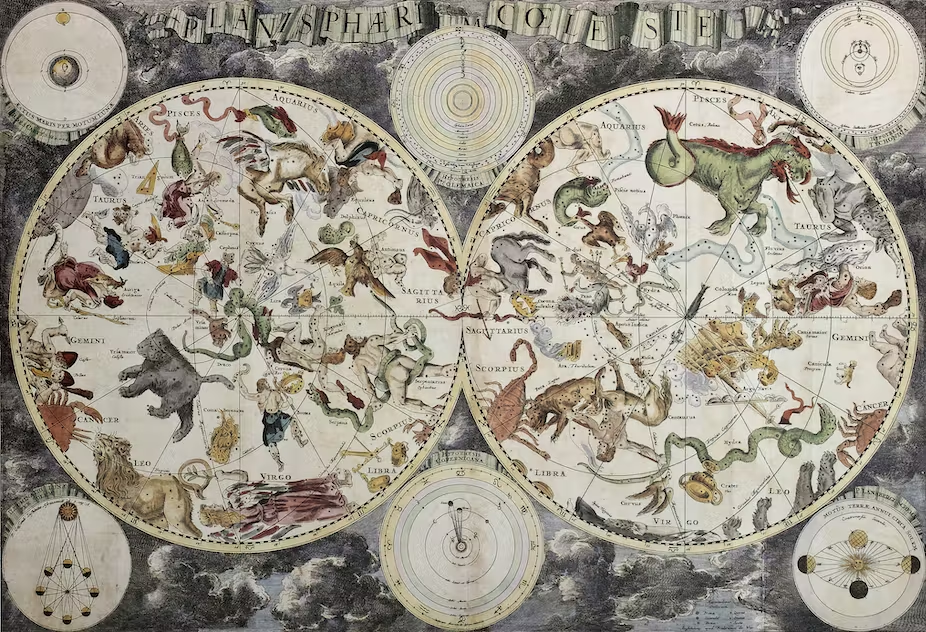Astronomy vs. Astrology: How Much is Real?
- Isabelle Parker

- Oct 30, 2022
- 7 min read
By Isabelle Parker

(Photo from sololos/ Getty)
At the start of human civilisation, astrology and astronomy were one and the same.
When there were no telescopes, no computers, no way to know what was truly out there, people had to rely solely on themselves and their religion to give them the answers that they needed. They formed ideas about the Universe that they believed to be true, ideas that are still circulating to this day.
But now that we have computers, data systems, and telescopes, we have to start questioning: How much of these old stories are real?
Astronomy vs. Astrology
Astronomy can be defined as the study of space, the Universe, and anything outside Earth's atmosphere. It uses chemistry, physics and mathematics to explain the creation, evolution, and contents of the Universe.
Astrology is the study of the influence of celestial bodies on human affairs and the world. A major part of astrology is the horoscope- twelve zodiac signs that are determined by the Sun's position on the day a person is born, and are said to predict an individual's personality.
Origins
Astronomy
Modern astronomy was contributed to by the Ancient Greeks, who discovered that the Earth was a sphere, as well as Egyptian astronomer Claudius Ptolemy.
Ptolemy developed a way to predict the movement of stars. His publication, Almagest, was used for the next thousand years of astronomy. The book contains data, tables and observations on the positions of celestial bodies that helped to develop a more complex model of the sky. He was responsible for the model of space that placed Earth at the centre of the solar system, a theory that was later proven incorrect by astronomical revolutionary Galileo Galilei.
Born in 1564, Galileo invented the telescope by creating his own version of a 'spyglass', and used it in 1609 to become the first person to record observations of the sky with a telescope. His first discovery was that the Moon is not a smooth sphere like other scientists believed it be, but in fact had mountains and pits. He then made discoveries about Jupiter's moons, at first believing they were stars, but then realising that they were in fact moons orbiting the planet. From pointing his telescope at Venus and its phases, Galileo realised that the planets orbited the Sun, not the Earth, and from pointing his telescope at the Sun, discovered it had dark sunspots.
Due to these observations, Galileo found that the Sun, not the Earth, was the centre of the Universe. His discoveries laid the foundation for today's astronomy.

Galileo Galilei with his telescope (Photo from Stefano Bianchetti/Corbis/Getty Images)
Astrology
Astrology originated long before modern astronomy emerged.
Astrology's earliest creation was in Babylonia, Mesopotamia, an ancient Akkadian speaking state that emerged around 2300 B.C. Babylonians believed that, since the gods ruled over human fate, the future could be seen in the moon and stars. They created the zodiacs by dividing the sky into twelve 30° sectors. They thought that by looking at the seasonal movements of the sun, moon and planets, they could connect their everyday lives to divine intervention. The Babylonians chose to ignore the 13th Zodiac sign, Orphiuchus, as they thought that 12 was neater than 13.
The Babylonians also believed that different planets represented different things- for example, Venus represented love and Jupiter represented power. The planets would have influence over whatever they symbolised.
The traditional 12 month calendar was also created in Babylonia, except there were 30 days in each month and only 360 days in a year.
The zodiacs were created around the late fifth century B.C. and were then shared to other parts of the ancient world. The system was refined by the Egyptians and Greeks until it became the astrology of today.
Because of the Earth's rotation on its axis, the zodiacs have actually shifted, and 86% of the world has a different horoscope from when they were invented.

Cuneiform tablet containing ancient Babylonian eclipse tables (Photo from the Trustees of the British Museum)
Astronomers vs. Astrologers
In the creation of this piece, two astronomers and two astrologers were interviewed about the science (or lack thereof) behind astrology.
The Experts
Cate Whelan completed her FAA (Federation of Australian Astrologers) degree in the mid-1990s, and became president of the FAA South Australia (FAASA) in 2011. She has been a teacher for the FAA syllabus in the past, and has now turned to researching sociological astrology.
Silvia Wilson is the vice president of the Queensland Federation of Astrologers Inc. (QFA), and a certified astrologer. She now teaches astrology at the QFA.
Professor Sarah Brough has published over 240 research papers examining how galaxies change over time, and represents Australia for the Australian Science Lead for LSST (Large Synoptic Survey Telescope). She was the former chair of the Astronomical Society of Australia's Inclusion Diversity and Equity in Astronomy Chapter, and is particularly interested in the Universe's largest galaxies.
Professor Steven Sherwood, a University of New South Wales (UNSW) Professor with a master’s and bachelor’s degree in physics, merely said that astrology “just seems like a bit of fun with no scientific credibility.”

A calendar taken from the title page of an almanac written by Nathanael Low in 1814 (Photo from VCG Wilson- Bettmann Archive)
The Questions
The astrologers were asked the following:
How would you convince people who don't believe in astrology that it is real?
Both astrologers agreed on this one- they would not.
Ms Wilson said that professional Astrologers “wouldn’t try to ‘convince’ others that don’t believe in Astrology that it is real.”
Ms Whelan likened astrology to a faith, stating that “There is a saying about the existence of God: For those who believe, no proof is necessary. For those who don't believe, no proof is possible. You could probably apply this to astrology!”
She then suggested that “the only way to help sceptics understand astrology would be for them to have a consultation with a good astrologer. But of course they are not likely to do that!”
What research tools and methods are used to study astrology?
Ms Whelan joked at first, asking “How many years do you have to discuss this?”
She then went into further detail, explaining that “To do a birth chart, or horoscope, the astrologer needs the time, date and place of birth. From this they draw up a map - these days on a computer, but originally using complex celestial mathematics. The astrologer then interprets this map in a symbolic way to understand the person's strengths, challenges, approach to life, etc.”
This answer focuses on the individual consultations that an astronomer performs. She explained that “astrology has been used more as a tool for personal development, and many astrologers have also studied psychology and counselling”, rather than its origins as a tool to foresee the future.
Could this be the way that astrology is headed? With more and more scientific evidence to support astronomy, and almost none to support astrology, perhaps the field is turning more towards counselling and guidance rather than predicting the future.

The Tower of Babel by Pieter Bruegel the Elder
The astronomers were asked these questions:
Do the movements of the stars, planets, etc. affect Earth and humans in any way?
Prof Brough claimed, “Not in the sense that astrology uses. But yes in the sense that e.g. the moon causes tides, and if the other planets and stars weren't there, our solar system and host galaxy would look very different and the Earth might not be here without them.”
She then referenced the creation of astrology, and how it might’ve become astronomy, adding, “Also in the sense that people looked up at the stars and used them for navigation or were inspired to become scientists and answer questions about our universe...”
Does this suggest that the first astrologers were the inspiration for today’s astronomers? And was the birth of astronomy reliant on astrology?
As explored earlier in this article, astrology was developed long before astronomy, and it did grow into the science-based field that we now rely on. But it is not as simple as astrology becoming astronomy. Both astrology and astronomy are still used today, so one hasn’t evolved to be the other. They are different fields that have emerged from one origin.
Are there parts of astrology that are true?
Prof Brough simply stated, “Not to my knowledge.”

1680 astrological sky map (Photo from Marzolino/ Shutterstock)
Both groups were asked this question:
Is there any scientific evidence to support astrology? Prof Brough said again, “Not to my knowledge”.
Ms Wilson explained that “Scientists and Astrologers disagree, even though lots of research has been conducted by many astrologers over the years, and lots of good information is available online.”
Ms Whelan said that the question “makes the assumption that astrology needs to be proven by science, and that there is some kind of cause and effect relationship between the planets and world or personal events.
“Astrologers do not claim that planetary positions and connections CAUSE these events- just that astrology provides a map for us to see these events and the reasons behind them. Very little astrology is actually predictive”.
This makes it clear that astrology has drifted away from trying to predict the future. It has evolved alongside, not into, astronomy, and is now used for more personal reasons. Society relies less on these spiritual beliefs to rule lives, but astrology is still an important part of the world.
Ms Whelan confirms this, saying that “Most astrologers use their knowledge of astrology to help people understand themselves.”
Conclusion
From looking at these interviews, it seems that the claims made by astrology in its earliest form are not true - and that many astrologers are aware this.
As Prof Brough mentioned, there are some things in space that influence us directly. The moon creates the ocean's tides, and Jupiter is thought to have protected Earth from planetesimals in the early days of the Universe. But in the way of astrology, it seems that Earth is on its own.
Astrologers now use their practice to guide other people, much like with religion. When people feel helpless, they can turn to the stars, and when people feel lost, they can turn to their horoscope. Astrology is no longer the future-telling miracle that it was 4000 years ago, and is now merely a guide for people who chose to believe in it.

Planet Earth (Photo from Getty)
How Much is Real?
At the beginning of creating this article, I believed that astrology was an irrelevant, outdated practice that only misguided people followed.
Now, I understand that most astrologers don’t really believe that the stars can predict the future; instead, they treat their faith like a religion. True astrologers aren’t bothered by people who don’t believe in their practice, contrary to the hundreds of obnoxious social media users I’ve seen preaching their beliefs. These people gave me a bad impression of astrologers; but I now know that the real experts are truly just devoting themselves to their passion like anyone else.
The intent of this article was to disprove astrology. Instead, I learned more about the ancient practice and how deeply it influenced astronomy.
I admit that I will still scoff at the mention of a star sign, or roll my eyes when someone blames their mood on their horoscope; but at least now I know, that at one point in time, astrology was just a few people looking up at the stars and trying to figure out the world.
I mean, isn’t that what we’re all doing?

Earth and the Moon (Photo from Mars Express, NASA)



Comments